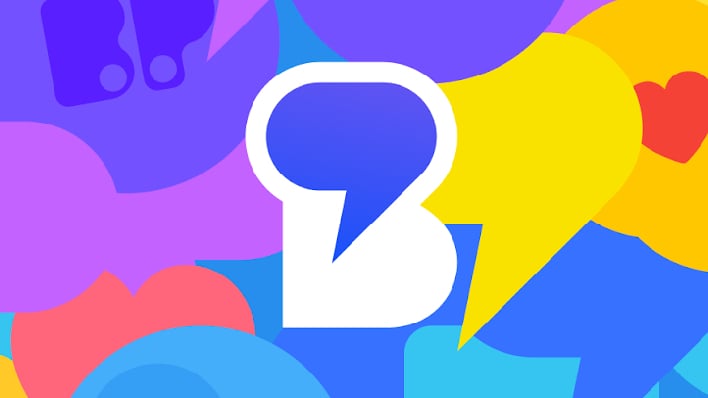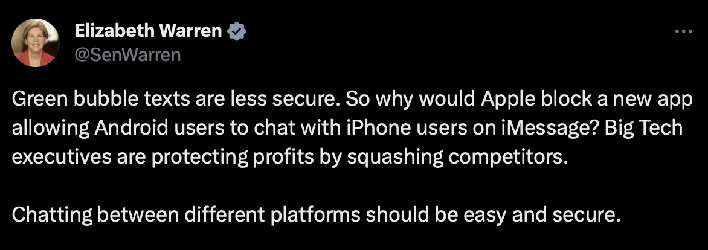US Senator Blasts Apple For Hobbling Beeper Mini iMessage App For Android

The app in question is called Beeper Mini, and is a standalone Android app built to specifically send and receive blue bubble messages with iPhone devices. It also comes packed with many of the same features iPhone users have enjoyed, such as typing status, read receipts, full resolution attachments, and more. The app did not use a Mac relay server in the cloud like previous failed attempts to loosen Apple's grip on blue bubble exclusivity, and instead it connects directly to Apple servers to send and receive end-to-end encrypted messages. This was perhaps the app’s ultimate undoing, as Apple has now blocked it from being able to be used.
The blocking of the app by Apple prompted Senator Warren to speak out on her X account. She remarked, “Green bubble texts are less secure. So why would Apple block a new app allowing Android users to chat with iPhone users on iMessages?” She added, “Big Tech executives are protecting profits by squashing competitors. Chatting between different platforms should be easy and secure.”
The creators of Beeper Mini are clear on the website for the app that its software is not affiliated with, sponsored, or endorsed by, Apple, or any other chat network. The company figured out a way to make an Android user’s phone number a blue bubble. Other companies, such as Nothing, attempted to make the process work by using systems with remote Macs logged into a user’s Apple ID. Ultimately, Nothing’s attempt failed because of security and privacy risks.
In an interview with The Verge, Beeper CEO Eric Migicovsky remarked, “If it’s Apple, then I think the biggest question is… if Apple truly cares about the privacy and security of their iPhone users, why would they stop a service that enables their own users to now send encrypted messages to Android users, rather than using unsecure SMS?”
Now that people like Senator Warren are seeing the advantages of apps like Beeper Mini, and disadvantages when blocked, time will tell if Congress or another American federal entity takes action against Apple and its fortress of solitude.
**Update 12/11/2023 12:50pm: Beeper Mini sent out an update via an email to those signed up to its blog, stating, "We've created an updated version of Beeper Mini that fixes an issue that caused messages not to be sent or received." The update does include that users will now have to sign in with an Apple ID, instead of the prior phone number registration. The company says it is currently working on a way to resolve having to use an Apple ID, and asks users to leave a positive review on the Google Play Store as the recent issue caused the app to drop "preciptously" on Friday.
Beeper Mini also noted in the email, "Beeper Cloud’s new Oct 2023 iMessage bridge never used Mac relay servers and still does not today. It uses a similar method to Beeper Mini, but runs on a cloud server." Following that information, the email remarked, "At the same time, we took steps to deregister all phone numbers associated with Beeper Mini, and we sent push notifications to all users updating them on the situation. In hindsight, our timing was a mistake: we should have communicated to our users sooner. We’re extremely sorry for the inconvenience caused by the outage."
The email also stated that Beeper Mini has yet to receive any communication from Apple, and added that if Apple doubted the security and privacy of the app, that it would be willing to share the entire Beeper Mini codebase with an outside third-party security research firm to be evaluated. Also, Beeper Mini would be willing to add a paper emoji to metadata to all messages sent via the app, if Apple insisted upon it.
The ball is now back in Apple's court...


